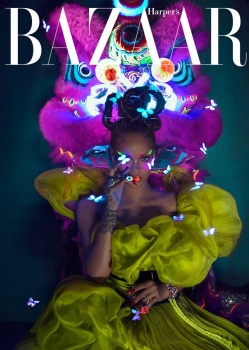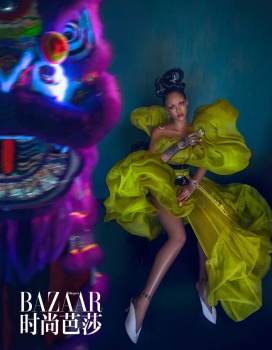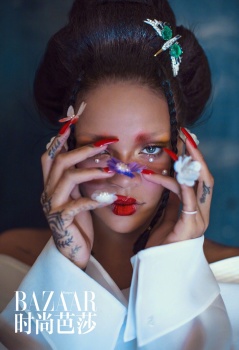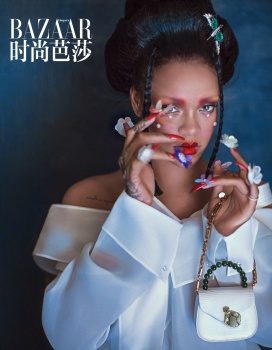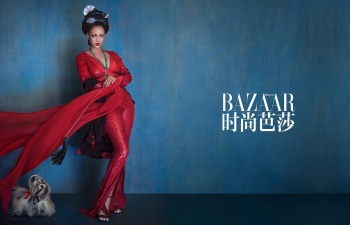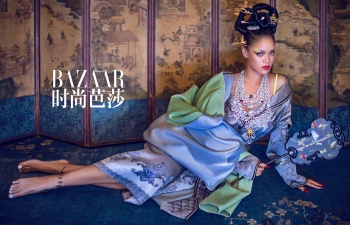Rihanna's Latest Cover Provoked Cries of Cultural Appropriation, but Chinese Netizens Disagree
SHANGHAI, China — On July 9, Harper’s Bazaar China unveiled images from its August cover shoot featuring Rihanna.
The cover likely served a wider purpose. On July 4, Fenty Beauty’s Weibo account made its first greeting to Chinese beauty fans, spurring rumours of a local launch — its products are currently available in Hong Kong, but haven’t yet hit the mainland. When the Harper’s Bazaar China cover was unveiled, the account reposted one of the images alongside the caption “It’s your turn to shine,” but the post has since been deleted.
If the purpose of the shoot was to get people talking about Rihanna's beauty brand before it drops in China, it most definitely is working.
Shot by esteemed local photographer Chen Man, the Barbadian singer, actress and recent addition to the LVMH family sported couture gowns by Iris Van Herpen and Jean Paul Gaultier. But commentators on Twitter — a site only accessible in China via VPN — paid more attention to her elaborate hair, makeup and props (such as a Chinese hand fan and hand-painted screen), and were quick to cry cultural appropriation.
In such critiques, parallels were drawn between the cover shoot and recent backlash against Kim Kardashian’s shapewear line, formerly named Kimono . But others were quick to point out that Rihanna’s shoot, unlike Kardashian’s attempted brand name, was produced by a Chinese team, and therefore involved collaborations with local creatives and acknowledgment of their inclusion on social media.
Little did they know that in China, netizens were having a completely different conversation.
“I’ve always said that she could pull anything off,” wrote top Chinese blogger Ye Si, better known as Gogoboi, on social media platform Weibo. “I didn’t expect that she would go down the Tang Dynasty route, and look sexy yet classy and graceful in a diamond necklace that probably weighs 10 tons. That’s beauty.”
Many other Chinese commentators agreed, refuting allegations of wrongdoing. “Why would we call this cultural appropriation?” asked user @LiwenqianLetitia. “I think that Riri using her influence to highlight Chinese culture is a great thing.”
Separate discussions revolved around whether Chinese culture was being depicted at all. In one camp, users found it hard to ignore the shoot’s references to Chinese culture and aesthetics. In another, users were confused by allegations of cultural appropriation altogether, or found the shoot to be more “pan Asian” than Chinese. But the general sentiment, unlike the backlash on Twitter and Instagram, was of appreciation, or at worst, speculation, rather than offence.
In fact, Chinese publications and netizens have taken it upon themselves to revive Rihanna’s little known local moniker. As far back as 2011, Chinese netizens bestowed Rihanna with the nickname “Queen of Shandong” (Shandong tianhou), referring to the province in Eastern China, after her songs were phonetically translated using references of Chinese cities and cultural icons. Her song “We Found Love” was coined “Weifang de ai,” citing the Chinese city of Weifang. “Princess of China” was called “Huan zhu ge ge,” the name of local television series My Fair Princess.
Rihanna's Chinese-infused nickname really stuck after the star’s 2015 Met Gala appearance, when she wore a gown designed by Beijing-based couturier Guo Pei on the red carpet. The sweeping, 25kg empress cape — incessantly memed for its resemblance an omelette — went viral.
Where Rihanna has effectively been embraced by Chinese fans as one of their own, what many called orientalist in the West was seen as a stylistic ‘homecoming’ — one that many netizens had no issue with. “Rihanna added yet another Chinese cover to her arsenal... our Queen of Shandong strikes again with this masterpiece,” praised media account @Zhuixinggou.
It is perhaps telling that many of those most critical of the shoot live outside China while many of those most appreciative live in China. Consequently, some observers are drawing the conclusion that Chinese in China have different perceptions of cultural appropriation and appreciation than the Chinese or wider Asian diaspora in the West.
But according to Elisa Harca, co-founder and Asia chief executive of Shanghai-based digital marketing agency Red Ant, the Chinese response to Rihanna’s cover reveals a more nuanced view of debate around the distinction between cultural appropriation and appreciation. “It’s not that they care less [about it]. It’s more about [whether it’s] done with taste or not. [And] this shoot is,” Harca says.
“For Chinese people they are proud of their [country] and like to see the west embrace it, but in a tasteful and chic way,” she adds. “If the appreciation has style and has an element of understanding for where Chinese culture currently is, it’s deemed interesting, relevant and appealing, not insensitive.”
Additional reporting by Queennie Yang

